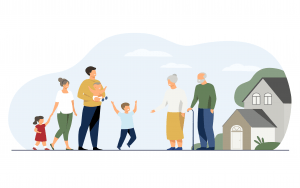
People often believe that when their parents pass there are two possible scenarios with respect to debt:
- Adult children are liable for their parent’s debt, or
- Adult children don’t have to pay their parent’s bills.
Now even if you don’t have to pay your parent’s bills directly, debt can reduce what you inherit. So, debt does not simply disappear when someone dies. Creditors can file claims against the Estate, and those claims have to be paid before any distribution of the residue to family members.
When you can and can’t be held responsible for your parent’s debt?
Generally, family members don’t have to use their own money to pay a dead relative’s debt unless they have the following responsibilities:
- Co-signed on a loan,
- Are the surviving spouse and live in community property, or
- Were legally responsible for settling the Estate.
A question we often get is if there are products like TFSA, RRSP, Insurance products and they have defined beneficiaries do you have to use this money to pay the debt?
The answer is no—directly. But the deceased debts survive the death; so, if the TFSA Beneficiary is also the Estate Beneficiary, the debt to be paid will reduce the residue of the Estate.
Generally, if someone dies with more debt than assets, the person’s Estate is considered insolvent and Provincial law typically determines the order in which bills get paid.
Legal and other fees for administration of the estate are paid, as well as funeral and burial expenses. Prior to any payment to heirs, first and foremost, however, federal and provincial taxes get paid.
So, the rule of thumb is all creditors get paid first and in full and any remaining assets can then be distributed to heirs. The one opportunity is to bypass funds being in the Estate if you have products like TFSA, RRSP, RESP, and Insurance products that go directly to beneficiaries. These products also avoid Probate fees. So, it pays to plan!
If you own digital assets like a Facebook page or a Google email account, what happens to them when you die? Read about it here
Want more information?
Are you interested in a consultation with Peter R. Welsh?
Contact me at Peter@SmartWills.ca
By telephone 416-526-3121
Register for our blog to get valuable tips and up-to-date alerts.
This material is for general information and educational purposes only. Information is based on data gathered from what we believe are reliable sources. It is not guaranteed as to accuracy, does not purport to be complete and is not intended to be used as a primary basis for investment decisions.


